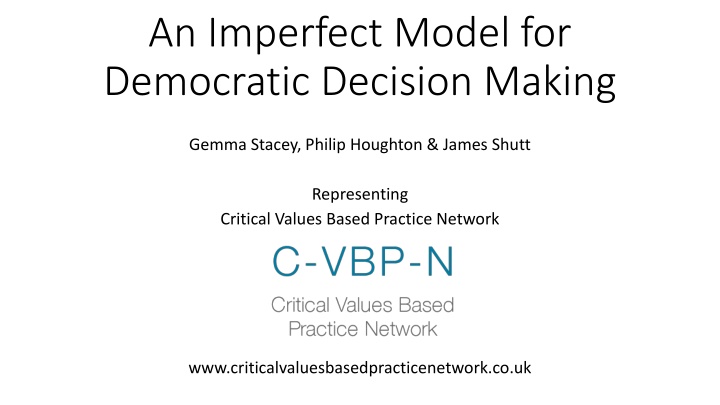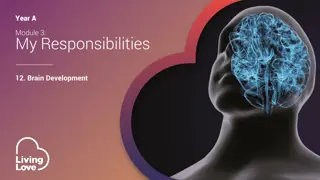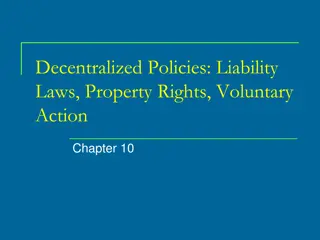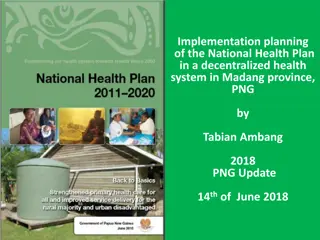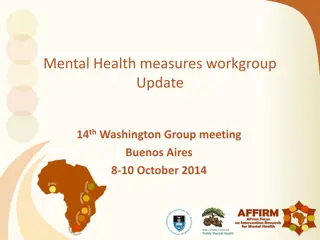Decentralized Decision Making in Mental Health Practice
This study explores shared decision-making in mental health settings, examining the perspectives of various stakeholders including service users, carers, occupational therapists, and social workers. Findings reveal discrepancies in involvement levels and power dynamics within decision-making processes, highlighting challenges faced by different groups in influencing outcomes and being included in discussions.
Download Presentation

Please find below an Image/Link to download the presentation.
The content on the website is provided AS IS for your information and personal use only. It may not be sold, licensed, or shared on other websites without obtaining consent from the author.If you encounter any issues during the download, it is possible that the publisher has removed the file from their server.
You are allowed to download the files provided on this website for personal or commercial use, subject to the condition that they are used lawfully. All files are the property of their respective owners.
The content on the website is provided AS IS for your information and personal use only. It may not be sold, licensed, or shared on other websites without obtaining consent from the author.
E N D
Presentation Transcript
An Imperfect Model for Democratic Decision Making Gemma Stacey, Philip Houghton & James Shutt Representing Critical Values Based Practice Network www.criticalvaluesbasedpracticenetwork.co.uk
AIMS Demonstrate an example of co-production which influences research, education and practice. Introduce a evidence based model of decision making applied to mental health practice which incorporates compulsory care. Facilitate discussion around a critique of this model in light of profession, legislative and social power.
Our position Values Based Practice was developed in a power vacuum Bill Fulford (2013)
Research Aim: To explore the experiences of shared decision making including the degree to which participants felt involved in the process and influential in the outcome Method Focus groups with people who have access or worked with in in-patient mental health settings in the past two years Critical Narrative Analysis Stories, positioning, purpose, destabilisation through a critical lens - POWER
Findings Insiders and Outsiders Social Workers Carers Peer support workers Psychiatrists Occupational Therapists Nurses
A Summary of Our Research Findings Service Users: highly critical of their lack of involvement in decision making forums. discussed the changing level of inclusion that they preferred at different phases of their contact with mental health services. recognised the need to appear to conform to the outcomes of decisions that they did not agree with, in order to achieve the end result they desired. Carers: positioned themselves as outside of the decision making process felt that their knowledge of their family member was often disregarded professional standards or structures, such as confidentiality, were seen to be used by professionals to exclude them from decision making forums and from being informed about the outcome of those decisions. Occupational Therapists: strongly aligned themselves with the service user which they felt gave other professionals the permission to side line clear about their unique area of expertise being focused on occupational assessment and promoting recovery, but did not feel this was valued by others.
Continued Social Workers: viewed their role as Approved Mental Health Practitioners as giving them a legitimised and outwardly respected position within the decision making processes in routine decision making within the ward setting, they viewed themselves as outsiders who were, at best, informed about the outcomes of decision but were rarely consulted in the process. Peer Support Workers: described having no voice within decision making forums dealing with the often conflicting role of being employed by the organisation whilst also attempting to advocate for service users. clear that their expertise lies with sharing the experience of mental distress. However, they did not feel that the structures were in place to utilise or respect this within the decision making process.
Continued Psychiatrists: positioned themselves as attempting to involve other professionals in the decision making process, but were continuously relied upon to make the definitive decision. recognised that their education and social position influenced this and acknowledged that their salary was often regarded as the justification by other professional for their lack of willingness to take responsibility for the outcome of decisions. Nurses: viewed themselves as the enforcers of the decisions which were made by other professional groups, most significantly psychiatrists. reiterated the expertise they held as a result of being the professional group who spent the most time with the service user. discussed their lack of willingness to make decisions which were perceived to be the responsibility of the psychiatrists, due to the level of accountability they associated with the psychiatrists role
Key Finding The ward round was identified by all groups as the main forum for decision making. All agreed it was not fit for purpose but no group was able to identify an alternative which would be more conducive to shared decision making. What if . It is just not possible?
An Imperfect Model: 3 I s of shared decision making A Sliding Scale of Influence Informed Involved Influential
What is Shared Decision Making? .the conversation that happens between a patient and their health professional to reach a healthcare choice together. This conversation needs patients and professionals to understand what is important to the other person when choosing a treatment. - NHS Shared Decision Making Website 2012 A combination of the health professionals knowledge and expertise with the service user s awareness of their own life and circumstances and the impact interventions may have on this. Service Users who are active participants in their healthcare have better outcomes (Kings fund report, 2011).
Does it happen? SDM is not yet the norm in the NHS At least half of patients involved in an episode of hospital care would have liked more involvement. This trend has not improved in the last 10 years (King s Fund Report). With regards to mental health, NICE guidance states that at present a significant proportion of service users are not being fully involved in decision making processes.
Challenges to SDM in Mental Health Care There is a lack of acknowledgement around the issues of Power and Interest which significantly impact on shared decision making. Within decision making processes power can be seen as the ability of an individual or organisation to influence the decision in line with what they think the outcome should be (their interests) Power can be thought of in terms of Proximal Powers and Distal Powers. Proximal Powers are the causes and influences which we experience and see that are close to us (e.g. differential power of professional and service user). Distal powers are more remote causes and influences which we may be less aware of (e.g. legal framework, market structures, policy).
The need for a different framework Need transparency and honesty around issues of power and interest Need to highlight how in certain situations SDM is not possible Need a framework which can incorporate different levels of co-production and shared decision making in relation to issues of power and interest. The 3 i s of being informed, involved and influential is one possibility. Being Informed entails everyone knowing what is available for consideration in a decision. Being involved refers to each party contributing to the decision making process. Being influential refers to the power to follow a particular course of action even when it is not in line with the majority view. True SDM should be based on the service user being influential and other stakeholders being involved in the process. This is not always possible in Mental Health services.
